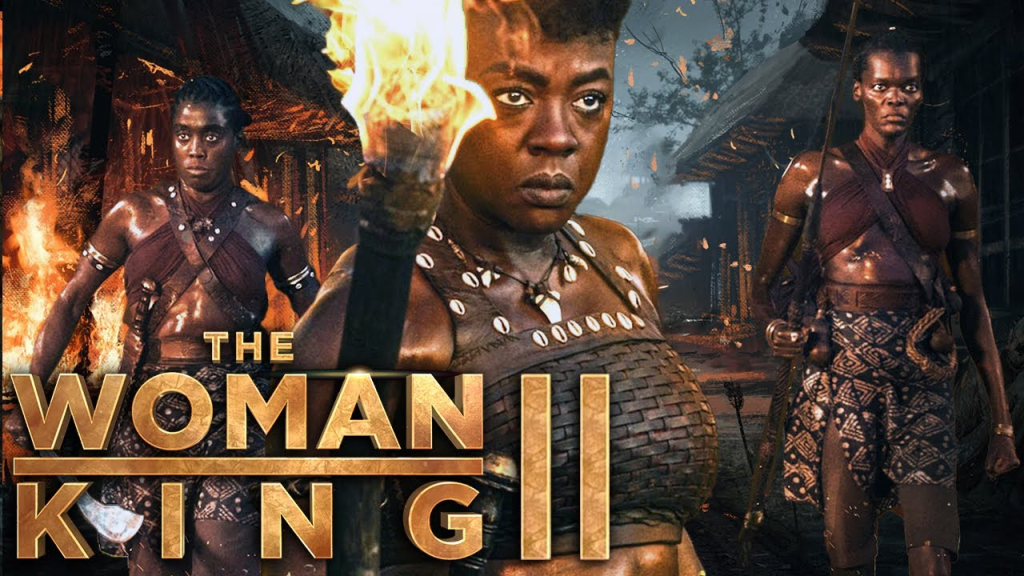Set in the 1820s in the West African Kingdom of Dahomey, The Woman King tells the inspiring and powerful story of General Nanisca (Viola Davis), the fierce leader of the Agojie—an elite all-female warrior regiment tasked with protecting their kingdom. As Dahomey faces threats from the rival Oyo Empire and European slave traders, Nanisca trains a new generation of warriors, including the headstrong Nawi (Thuso Mbedu), who struggles with her identity and past. The film follows their courageous battles to defend their homeland, confront personal and political betrayals, and challenge the brutal slave trade. Nanisca’s leadership culminates in a decisive confrontation with the Oyo general Oba Ade, while the film explores themes of family, legacy, and female empowerment.

2. Notable Elements
- Performances: Viola Davis delivers a commanding and emotionally resonant performance as Nanisca, embodying strength, vulnerability, and leadership. Thuso Mbedu shines as Nawi, portraying a complex character torn between rebellion and duty. Lashana Lynch’s Izogie adds depth as a seasoned warrior and mentor. John Boyega’s portrayal of King Ghezo balances authority with political nuance.
- Action Sequences and Cinematography: The film features intense, well-choreographed battle scenes that highlight the Agojie’s combat skills and strategic prowess. Cinematographer Polly Morgan captures the lush landscapes of Dahomey and the brutal realities of war with vivid, immersive visuals.
- Historical and Cultural Authenticity: The film stands out for its respectful and detailed depiction of Dahomey’s culture and history, spotlighting a lesser-known chapter of African history with authenticity and pride.

3. Themes and Messages
- Female Empowerment and Leadership: Central to the film is the celebration of women’s strength, resilience, and leadership in a male-dominated world. The Agojie warriors challenge traditional gender roles and inspire through their bravery.
- Legacy and Identity: The story explores how personal and collective histories shape identity, as seen in Nawi’s journey and Nanisca’s revelations about her past.
- Resistance and Freedom: The film critiques the horrors of the slave trade and colonial exploitation, emphasizing the fight for autonomy and justice.
- Family and Sacrifice: The bonds between Nanisca, Nawi, and their comrades underscore themes of loyalty, sacrifice, and the cost of war.

4. Personal Impressions
The Woman King is a stirring and empowering epic that combines thrilling action with rich character development. Viola Davis anchors the film with a powerful performance that commands attention and empathy. The film’s balance of personal stories and grand historical scope makes it both emotionally engaging and intellectually stimulating. Some scenes may feel familiar to fans of historical dramas, but the unique focus on the Agojie and Dahomey’s history sets it apart. The film’s pacing and emotional depth make it a standout in the genre.

5. Audience Recommendations
This movie is highly recommended for viewers interested in historical dramas, stories of female empowerment, and African history. Fans of action-packed epics with strong character arcs will appreciate The Woman King. It is also suitable for audiences seeking inspiring narratives about courage and leadership.
6. Conclusions and Ratings
The Woman King is a remarkable film that shines a light on a powerful and inspiring chapter of history. With outstanding performances, compelling storytelling, and breathtaking visuals, it is a must-watch.
Rating: 4.5 out of 5 stars
7. Trailer on YouTube
Watch the official trailer here:
Images:
- Viola Davis as General Nanisca leading the Agojie into battle.
- Thuso Mbedu as Nawi during her warrior training.
- The lush and vibrant landscapes of the Kingdom of Dahomey.
